Are Megamillion Georgia Verdicts 'Nuclear' or Sign of the Times?
Defense lawyers say record verdicts, including recent $125 million and $280 million awards in Muscogee County, have sharply raised the valuation bar for settlements, while plaintiffs lawyers say insurers are refusing "reasonable" settlements.
October 08, 2019 at 04:14 PM
12 minute read
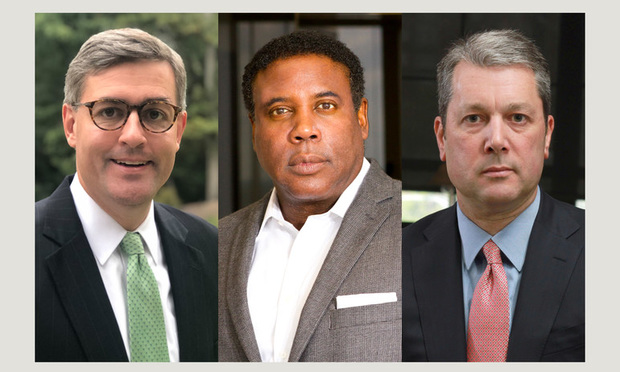 Brandon Peak of Butler Wooten & Peak (from left), Robert L. "Bobby" Shannon Jr., Baker Donelson, and Pete Law, Law & Moran.
Brandon Peak of Butler Wooten & Peak (from left), Robert L. "Bobby" Shannon Jr., Baker Donelson, and Pete Law, Law & Moran.
An eye-popping $280 million Muscogee County jury verdict for a woman killed in a tractor-trailer wreck was the largest so far this year in a string of Georgia jury awards in the tens and even hundreds of millions in catastrophic injury and death trials.
Defense lawyers say the number and size of these multimillion-dollar verdicts have sharply increased in Georgia, because of a changed jury climate, and they're having a profound effect on settlement negotiations.
Jumbo verdicts have sharply raised the valuation bar for settlements, said Bobby Shannon, the defense lawyer on the other side of the $280 million Muscogee verdict.
Shannon, a partner at Baker, Donelson, Bearman, Caldwell & Berkowitz who tries high-exposure catastrophic injury and death cases around the country, said he's seen some demand packages from plaintiffs that exceed $100 million. "Below the iceberg [of these verdicts] are the negotiations going on in high-exposure cases. Under the waterline, we've settled cases that have dramatically shifted upward in value. Companies do not want to run the risk of a $280 million verdict," he said.
But the plaintiff lawyers behind these megaverdicts said there was nothing outsize about the jury awards, considering what their clients have suffered, and that they don't see a pattern. The issue, they say, is that insurance companies are refusing to settle on reasonable terms—and instead, are taking a gamble on a trial.
'Repulsive' Conduct
For several major Georgia verdicts, the plaintiff lawyers point to the catastrophic damages, pain and suffering in each case and the defendants' conduct.
Large jury verdicts are not a trend in Georgia or anywhere else, said Brandon Peak of Butler Wooten & Peak, who won the $280 million verdict in August with his law partner, Joel Wooten—a record for Muscogee and the largest-ever nationally against a trucking company. "These are good cases with great clients that would result in a good verdict no matter where they were tried."
That verdict was for the death of Judy Madere, who was riding in a car with two grandchildren, her sister and daughter when it was hit by a tractor-trailer that killed all of them. The driver was hauling steel for Schnitzer Southeast, a subsidiary of Schnitzer Steel.
A jury returned a $125 million verdict on July 1, also in Muscogee, for the death of Charles Hart, a 62-year-old disabled steelworker who suffocated to death in 98-degree summer heat in his room at The Ralston hotel in Columbus. According to trial testimony, the building was poorly maintained with nonfunctional air-conditioning and management that evicted anyone who complained.
 Charlie Gower
Charlie GowerAustin Gower, who assisted his father, Charlie Gower, in winning the $125 million Muscogee verdict, agreed with Peak. "We weren't shocked by the verdict at all. The conduct of the defendants was repulsive," he said.
In Atlanta, plaintiffs firm Law & Moran racked up three eight-figure verdicts last spring: an almost $43 million Fulton County judgment for a man shot and severely injured in a CVS parking lot (with James A. Rice Jr. P.C. as co-counsel); a $69.6 million DeKalb County verdict for a man left paraplegic from a shooting in a Kroger parking lot during a robbery and carjacking; and a $21.6 million verdict for a Dalton man who lost a leg in an accident with a truck.
"I don't think any of my verdicts were inappropriate or unreasonable if you look at the damages," said Pete Law of Law & Moran. "No one would trade places with any of my clients for those verdicts. All three were catastrophically injured, and there was clear liability."
Shift in Jury Climate
But a veteran mediator and several defense lawyers said the proliferation of high-dollar Georgia verdicts—now in the tens and hundreds of millions—is unprecedented.
"This is a new phenomenon," said M. Gino Brogdon Sr. of Henning Mediation and Arbitration Service, who was the neutral in the settlement talks for Law & Moran's suits against Kroger and CVS. He estimated that the surge in jumbo verdicts started around five years ago.
Brogdon, a former Fulton County Superior Court judge, attributes them to a change in jurors' outlook. "Our political, financial and environmental climates have made our citizens edgy," he said. "People are anxious, and they're angry."
When juries return a jumbo verdict, Brogdon said, "Either the defense missed something and misinterpreted some really important optic of the trial—or the plaintiff tapped into the jury's anger."
"When they get permission to strike out, they do," he said. "It gives them a cathartic feeling. That's why you get these $280 million spikes."
More severe injury and death cases are settling, because otherwise the defendants risk these high-dollar verdicts, Brogdon said. While defendants still win at trial more often, when juries do decide for the plaintiffs, the awards are getting bigger, he added.
$400 Million Ask?
Shannon, the defense lawyer on the other side of the $280 million Muscogee verdict, said he's seeing jumbo verdicts nationally, not just in Georgia.
"How have we gotten to the point in a single-death case where a plaintiffs lawyer feels comfortable asking for almost $400 million?" Shannon asked. That was the amount that Peak asked the Muscogee jury to award in the weeklong trial over Judy Madere's death.
The jury returned its $280 million verdict in just 45 minutes. It awarded $100 million for punitive damages, $180 million for the value of Madere's life and her pain and suffering—plus $65,000 in attorneys fees.
"These types of verdicts have shifted people's perception of value," Shannon said. "It makes negotiations very difficult."
Shannon is on a trial calendar every month, he said, so his team frequently presents mock trials of upcoming cases for 40-person focus groups—and the mock juries' discussions about compensation have changed. "When you listen to them, the numbers are bewildering," he said.
But Darren Summerville, who handles appellate cases for 50 to 70 plaintiffs firms around the state, said the big numbers should not be a surprise. "As people have become inured to headlines that are almost apocalyptic every day, the notion that you can ask for millions of dollars for a life is not shocking at all. And it shouldn't be," he said.
Dan Huff of Huff Powell & Bailey, who primarily defends medical malpractice cases, said he too is seeing more multimillion-dollar verdicts in cases where someone has suffered permanent injury or died. "We still win the majority of the cases that we try, but when they're lost, the verdicts are much higher."
Most of the jumbo verdicts are for premises liability and trucking cases, Huff said, where defendant corporations have deep pockets. Corporate defendants' insurance policy limits can be in the multimillion-dollar range, he added.
Benchmark Verdicts
Peak downplayed his $280 million verdict's size, saying that the case settled for far less than the verdict after the trial, but he declined to specify for how much.
Austin Gower also said a big verdict may not be the victim's actual compensation. Since winning the $125 million jury award, he said, his firm, Charles A. Gower P.C., has again tried to settle with The Ralston hotel and its New York nonprofit owner, Schoolhouse Road Estates, for their $11 million insurance policy limit—but so far to no avail. That was the same amount they asked for pretrial, he added.
But defense lawyer Huff said, even if cases are resolved posttrial for far less than the verdict, the risk of substantially higher jury awards has given plaintiffs leverage to increase the price of a settlement—and get it.
"Settlements are confidential. No one knows the amount—and the verdict stands," he said. "Now when you're looking at the risk of trying a case, your assessment has to include the fact that in the current climate a potential verdict may be substantially higher."
Shannon called such enormous verdicts "nuclear," because they are multiple millions higher than the defense's assessment—and he said they are changing the negotiating dynamic.
"A nuclear verdict is explosive," he said. "You do not anticipate how powerful it is until it blows up—and it has consequences that last a long time."
The largest jury verdict in Muscogee County before the July and August trials was around $20 million, Shannon said. Now the benchmarks are $125 million and $280 million.
Forced to Trial
The issue is not multimillion-dollar jury verdicts, Peak said, but recalcitrant insurance companies that won't meet plaintiffs' settlement offers. "They forced us to go to trial," he said of Schnitzer and its insurers.
Before the $280 million jury award, he said, the defendant's insurance companies rejected three pretrial opportunities to settle within the policy limits. He declined to say how much his client, Madere's widower, asked for.
Shannon would not divulge the settlement offers either, citing confidentiality, but he said his clients, often large Fortune 100 companies, can carry millions of dollars in insurance coverage between their insurers and excess coverage carriers.
"Speaking generally," he said, "I routinely get demands that are within policy limits on policies that could run into the tens of millions or hundreds of millions. I got a settlement demand the other day for $200 million."
Law, who won the big Atlanta and Dalton verdicts, agreed with the other plaintiff lawyers that insurers are forcing them to try high-exposure cases. "There's no trend of big jury verdicts. There's a trend of insurance companies not making reasonable offers," he said, adding that in his three cases the defendants refused even to pay the medical expenses for his clients, all permanently injured.
"The insurance companies are choosing to gamble [at trial], and then they complain afterwards," Law said. The defense lawyers on his cases were "extremely experienced and highly qualified," he added, from firms including Weinberg Wheeler Gunn & Dial; Copeland, Stair, Kingma & Lovell; and Bendin Sumrall & Ladner.
In Columbus, Austin Gower said his firm's client, the daughter of the deceased, offered to settle for policy limits several times before trial. Instead, the defense offered a settlement of only $50,000 last year, which they upped to $1.5 million before trial and $5 million as the jury deliberated, the lead plaintiffs lawyer, Charlie Gower, told the Daily Report in July.
"If insurance companies would act right, we would not be going to court all the time," Austin Gower said of his firm's $125 million verdict. Five or 10 years ago, he said, "good cases were not making it to court, because insurance companies would pay."
Of the $125 million, the Muscogee jury awarded $50 million in punitive damages, plus $50 million for Hart's life and his pain and suffering. It awarded another $25 million in attorney's fees.
The defendant's lawyer, Jim Budd of Atlanta's Mabry & McClelland, declined to comment.
Insurer Control?
Summerville, the plaintiffs' appellate lawyer, said some insurance companies—despite using multiple databases to assess payouts—are not accurately valuing injury and death cases at the settlement table, because they're misevaluating the current jury climate.
"I don't think there is any room to complain about a jury verdict that very well may be appropriate when an insurance company has turned down an offer for a fraction of that," he added.
Summerville sits in on a lot of settlement negotiations in serious injury and death cases. "Sometimes the defense takes the advice of good local counsel—and sometimes they don't," he said, adding that insurance companies control the settlement offers, not the defense lawyers.
"As defense lawyers, we are not the decision-makers," Shannon agreed, explaining that, in high-severity cases with large corporate defendants, it's the company executives and their multiple insurers who ultimately decide whether to settle or try a case.
"I may say that there's a lot of risk in attacking that hill, but at the end of the day, when they order me to take the hill, I try to take the hill," said Shannon, a retired major general in the U.S. Air Force Reserve.
Summerville won a $128 million verdict himself last year, with his colleague Anna Cross and Buck Rogers of Fried Rogers Goldberg, from a Fannin County jury for a family that survived a tragic Fourth of July wreck. An impaired driver rear-ended their minivan, killing one child and seriously injuring the mother and her three other children, leaving one permanently paralyzed.
Before the trial in Blue Ridge, Summerville said, he asked his hotel's front desk receptionist if she thought $200 million would be out of bounds as compensation. "Not at all," she replied. "They are a great family."
The plaintiffs team ended up asking for $180 million.
This content has been archived. It is available through our partners, LexisNexis® and Bloomberg Law.
To view this content, please continue to their sites.
Not a Lexis Subscriber?
Subscribe Now
Not a Bloomberg Law Subscriber?
Subscribe Now
NOT FOR REPRINT
© 2025 ALM Global, LLC, All Rights Reserved. Request academic re-use from www.copyright.com. All other uses, submit a request to [email protected]. For more information visit Asset & Logo Licensing.
You Might Like
View All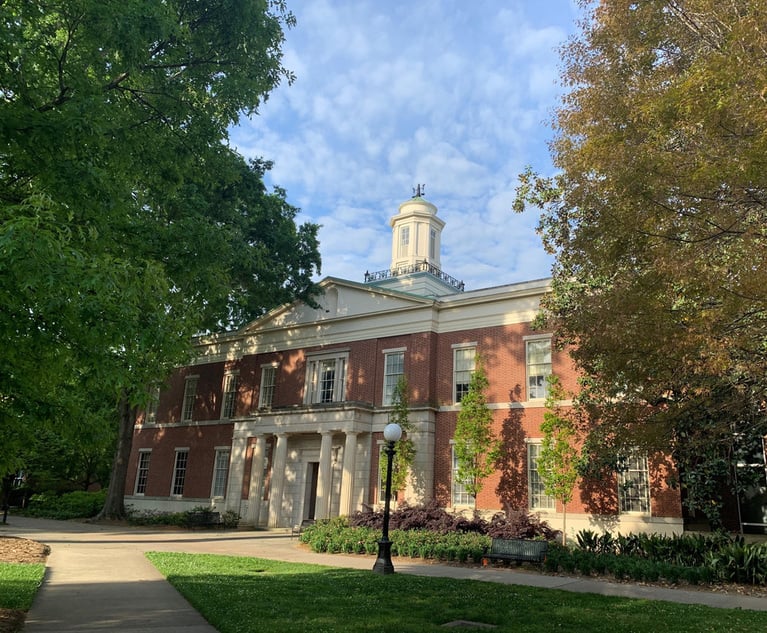
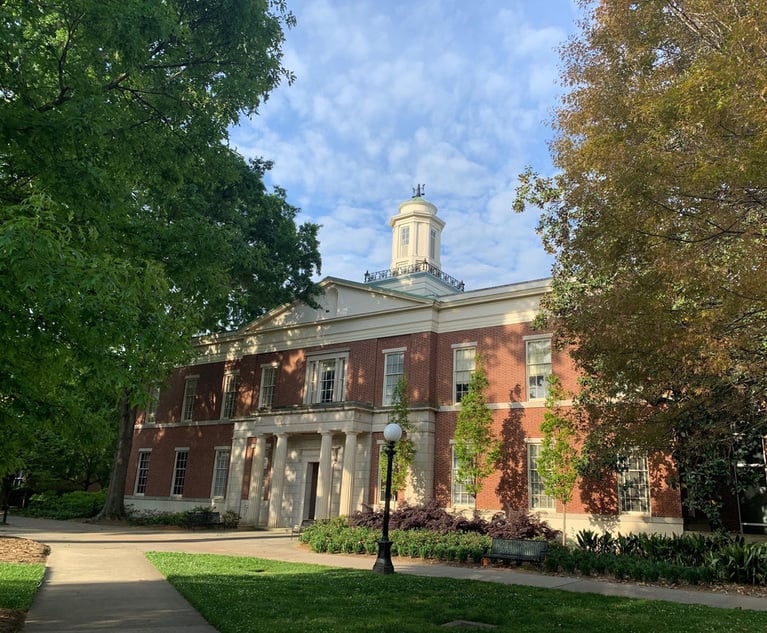
28 Firms Supporting Retired Barnes & Thornburg Litigator in Georgia Supreme Court Malpractice Case
7 minute read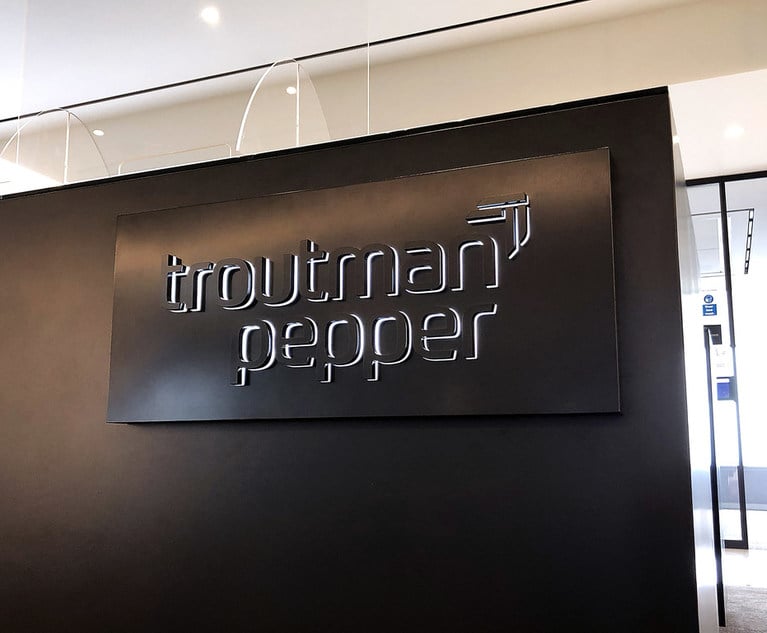
Troutman Pepper Says Ex-Associate Who Alleged Racial Discrimination Lost Job Because of Failure to Improve
6 minute read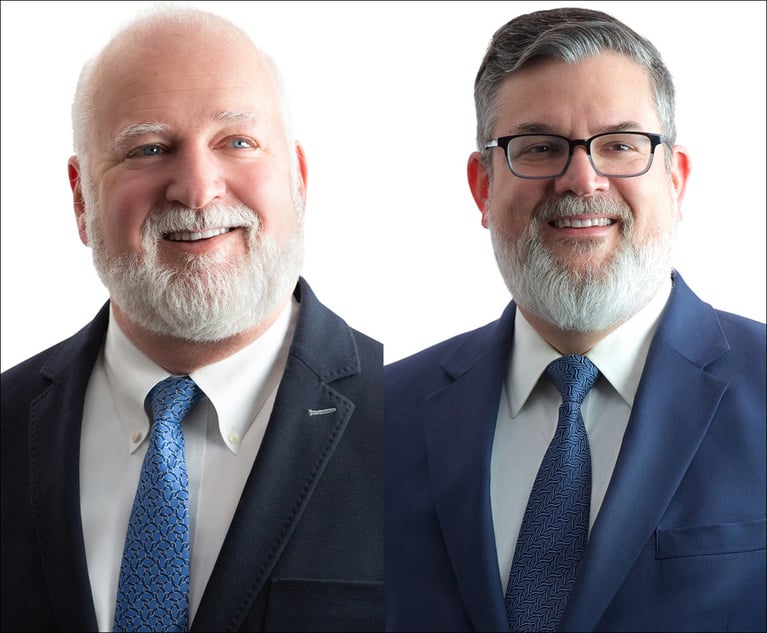
Trending Stories
- 1'A Shock to the System’: Some Government Attorneys Are Forced Out, While Others Weigh Job Options
- 2Lackawanna County Lawyer Fails to Shake Legal Mal Claims Over Sex With Client
- 3Florida Judge Denies Motion to Dismiss in $150M Plane Crash Lawsuit Involving Flow La Movie
- 4HSF Accounts Show US Operating Losses Last Year But Revenue Increased Slightly
- 5Sheppard Mullin, Morgan Lewis and Baker Botts Add Partners in Houston
Who Got The Work
J. Brugh Lower of Gibbons has entered an appearance for industrial equipment supplier Devco Corporation in a pending trademark infringement lawsuit. The suit, accusing the defendant of selling knock-off Graco products, was filed Dec. 18 in New Jersey District Court by Rivkin Radler on behalf of Graco Inc. and Graco Minnesota. The case, assigned to U.S. District Judge Zahid N. Quraishi, is 3:24-cv-11294, Graco Inc. et al v. Devco Corporation.
Who Got The Work
Rebecca Maller-Stein and Kent A. Yalowitz of Arnold & Porter Kaye Scholer have entered their appearances for Hanaco Venture Capital and its executives, Lior Prosor and David Frankel, in a pending securities lawsuit. The action, filed on Dec. 24 in New York Southern District Court by Zell, Aron & Co. on behalf of Goldeneye Advisors, accuses the defendants of negligently and fraudulently managing the plaintiff's $1 million investment. The case, assigned to U.S. District Judge Vernon S. Broderick, is 1:24-cv-09918, Goldeneye Advisors, LLC v. Hanaco Venture Capital, Ltd. et al.
Who Got The Work
Attorneys from A&O Shearman has stepped in as defense counsel for Toronto-Dominion Bank and other defendants in a pending securities class action. The suit, filed Dec. 11 in New York Southern District Court by Bleichmar Fonti & Auld, accuses the defendants of concealing the bank's 'pervasive' deficiencies in regards to its compliance with the Bank Secrecy Act and the quality of its anti-money laundering controls. The case, assigned to U.S. District Judge Arun Subramanian, is 1:24-cv-09445, Gonzalez v. The Toronto-Dominion Bank et al.
Who Got The Work
Crown Castle International, a Pennsylvania company providing shared communications infrastructure, has turned to Luke D. Wolf of Gordon Rees Scully Mansukhani to fend off a pending breach-of-contract lawsuit. The court action, filed Nov. 25 in Michigan Eastern District Court by Hooper Hathaway PC on behalf of The Town Residences LLC, accuses Crown Castle of failing to transfer approximately $30,000 in utility payments from T-Mobile in breach of a roof-top lease and assignment agreement. The case, assigned to U.S. District Judge Susan K. Declercq, is 2:24-cv-13131, The Town Residences LLC v. T-Mobile US, Inc. et al.
Who Got The Work
Wilfred P. Coronato and Daniel M. Schwartz of McCarter & English have stepped in as defense counsel to Electrolux Home Products Inc. in a pending product liability lawsuit. The court action, filed Nov. 26 in New York Eastern District Court by Poulos Lopiccolo PC and Nagel Rice LLP on behalf of David Stern, alleges that the defendant's refrigerators’ drawers and shelving repeatedly break and fall apart within months after purchase. The case, assigned to U.S. District Judge Joan M. Azrack, is 2:24-cv-08204, Stern v. Electrolux Home Products, Inc.
Featured Firms
Law Offices of Gary Martin Hays & Associates, P.C.
(470) 294-1674
Law Offices of Mark E. Salomone
(857) 444-6468
Smith & Hassler
(713) 739-1250






